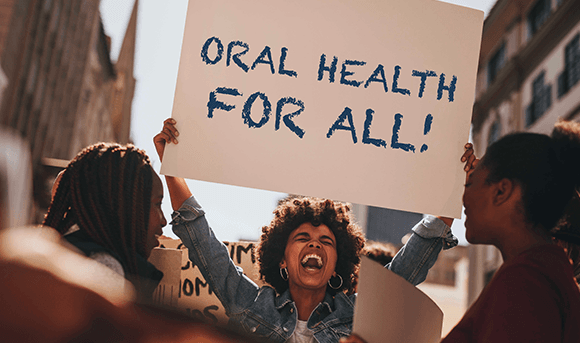In 2011, the United Nations General Assembly recognized that oral diseases constitute a significant health burden and share the same risk factors as other non-communicable diseases (NCDs). Eight years later, it reaffirmed “its strong commitment to the prevention and control of NCDs, in particular by strengthening and scaling up efforts to integrate oral health into the framework of universal health coverage (UHC)”. On January 11, the WHO announced its draft global action plan for oral health for 2023-2030.

In its draft action plan, the WHO sets two global targets: by 2030, 80% of the world's population should have access to essential oral care services, thanks to universal health coverage (UHC ) in oral health, and a 10% reduction in the burden of oral disease should be achieved.
WHO pursues six goals by supporting member states to:
Seek national leadership for oral health.
By 2030, 80% of countries should have an operational oral strategy, with dedicated oral health staff. Regarding the environment, 90% of the countries will have implemented measures to gradually reduce the use of dental amalgam, in accordance with the provisions of the Minamata Convention on mercury.
Promote oral health and help prevent oral diseases and conditions.
“Preventive measures target the main risk factors and the social and commercial determinants of oral diseases and conditions”. WHO projects that by 2030, at least 50% of countries will have implemented measures to reduce consumption of free sugars, and the same percentage will have national guidelines on optimal fluoride intake for their population (systemic fluoride intake [water, salt in particular], or topical [toothpaste, varnishes, gels or rinsing solutions, in particular]). It also wants countries to commit to reducing tobacco and alcohol consumption and tackling unhealthy diets. The WHO particularly emphasizes the need to ensure the “comprehensive promotion of oral health in schools”.
Improve and increase the qualification of health personnel to meet the needs of the population.
By 2030, “50% of countries will have an operational national health workforce policy, strategy or plan, including a trained workforce, to meet the needs of the population in oral health”. This includes implementing training programs to increase the number of dental surgeons and dental assistants but also training "qualified health workers" capable of providing a "set essential” of oral care in the field.
Integrate oral health into primary health care.
WHO encourages member countries to enable the integration of safe and affordable essential oral care into their health policies, and to restrict the use of dental amalgam to its encapsulated form, to strengthen the fight against antimicrobial resistance, or to reduce carbon emissions as much as possible. In 80% of countries, by 2030, oral health services will be available in hospitals, and half of the countries will have introduced dental preparations included in the WHO essential drug lists (glass ionomer cement, silver diamine fluoride, and fluoride in any form (toothpaste, cream, gel) dosed between 1,000 and 1,500 ppm) in their national list of essential medicines.
Monitor implementation for oral health.
Strengthen oral health information systems through the implementation of electronic patient files, help in the systematic collection of data on the state of oral health and its risk factors, promote the exchange of data, use artificial intelligence and mobile technology applications, help with ongoing staff training, etc. WHO will support the development of these technologies to provide timely information on oral health useful to decision-makers for the implementation of public health policies.
Develop oral health research.
By 2030, 50% of countries should have a national oral health research agenda. Member states are encouraged to seek public funding to facilitate the dissemination of oral health research agendas to all national research institutions, universities, and other stakeholders, as well as to assess the effectiveness of public health policies. oral health of their population.
The draft is yet to be approved by the General Assembly.




















Comments